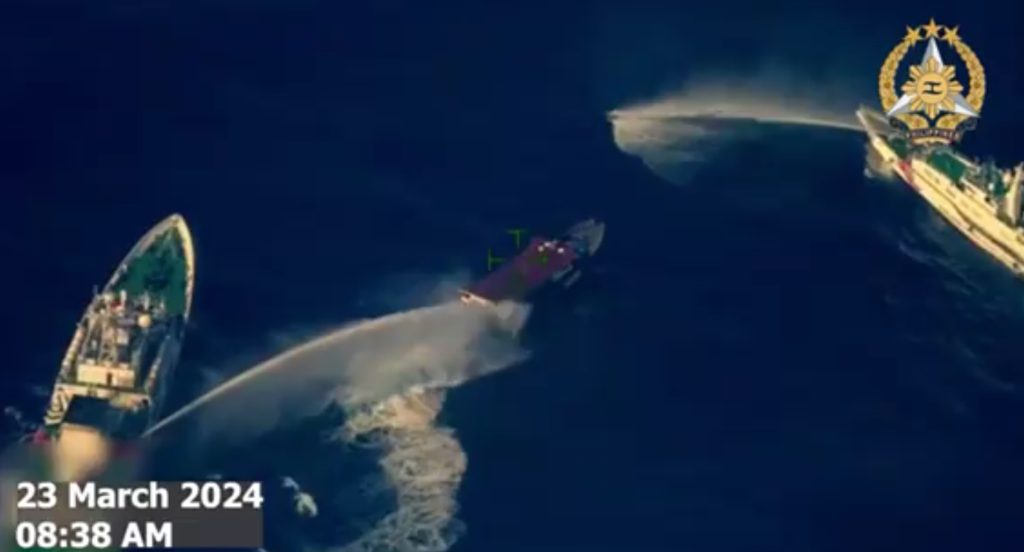Manila condemns Beijing’s unprovoked aggression in the West Philippine Sea

Two Chinese coast guard vessels simultaneously shoot water cannons at a local resupply boat on its way to Ayungin shoal. Screenshot from Armed Forces of the Philippines video.
By Manuel Mogato | Date 03-25-2024
MANILA — The Philippines has condemned the unprovoked aggression in the West Philippine Sea after the latest harassment near Second Thomas Shoal, which resulted in three men suffering injuries and their indigenous boat severely damaged.
“The actions of the agents of the People’s Republic of China (PRC) in the waters of the Philippine Exclusive Economic Zone (EEZ) show to the Filipino people, the region, and the world that it recognizes no reasonable or legal restraint nor limitation upon its actions under international law,” said Eduardo Año, a senior official of the National Task Force on West Philippines said.
“We demand that China demonstrate in deeds and not in words that it is a responsible and trustworthy member of the international community,” he added.
On March 23, two Chinese Coast Guard vessels blasted with water cannons the local supply boat, Unaizah May 4, as it approached Second Thomas Shoal, or Ayungin shoal, where a rusting World War 11 vintage naval transport had run aground in 1999.
A rigid-hulled boat from BRP Sierra Madre rescued the injured personnel and transferred the civilian supply boat’s food, water, and other supplies.
A Philippine Coast Guard also came to help and towed back the wooden-hulled boat to Palawan.
This was the second time within a month that Unaizah May 4 was damaged by powerful pressurized water from a Chinese Coast Guard water cannon.
On March 5, four Philippine Navy sailors were injured when the Unaizah May 4’s windshield was shattered by water cannons from two Chinese Coast Guard vessels.
The military said the Chinese Coast Guard had employed a new tactic to prevent local supply vessels from getting near the BRP Sierra Madre.
Assisted by Chinese militia vessels, they also installed barriers similar to what they had put up at Bajo de Masinloc, west of Subic Bay, to prevent Filipino boats from getting near BRP Sierra Madre.
On the same day of China’s harassment of the Philippine supply boat, the United States issued a statement condemning the “dangerous actions by the People’s Republic of China (PRC) against lawful Philippine maritime operations in the South China Sea on March 23.”
The US State Department said Chinese ships’ repeated employment of water cannons and reckless blocking maneuvers “resulted in injuries to Filipino service members and significant damage to their resupply vessel, rendering it immobile.”
China’s actions prevented personnel rotations and deprived Filipino service members at Second Thomas Shoal of necessary provisions.
“The PRC’s actions are destabilizing to the region and show clear disregard for international law,” the US State Department said.
Based on an international tribunal’s legally binding decision issued in July 2016, China has no lawful maritime claims to the waters around Second Thomas Shoal.
Second Thomas Shoal or Ayungin is a low tide feature clearly within the Philippines’ exclusive economic zone.
As provided under the 1982 Law of the Sea Convention, the 2016 arbitral decision is final and legally binding on China and the Philippines; the United States calls upon China to abide by the ruling and desist from its dangerous and destabilizing conduct.
“The United States reaffirms that Article IV of the 1951 U.S.-Philippines Mutual Defense Treaty extends to armed attacks on Philippine armed forces, public vessels, or aircraft – including those of its Coast Guard – anywhere in the South China Sea,” it added.
Buoyed by the US assurance, Año said the country will not be deterred by the “veiled threats or hostility” from “exercising our legal rights over our maritime zones, including Ayungin Shoal, which forms part of our EEZ and continental shelf.”
He said the Philippine government would “continue to act peacefully and responsibly, consistent with international law, particularly the United Nations Convention on the Law of the Sea and the legally binding 2016 Arbitral ruling. Peace and stability cannot be achieved without due regard for the legitimate, well-established, and legally settled rights of others.”
